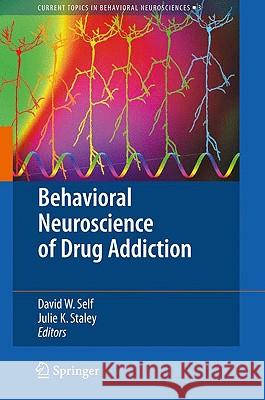Behavioral Neuroscience of Drug Addiction » książka
Behavioral Neuroscience of Drug Addiction
ISBN-13: 9783642030000 / Angielski / Twarda / 2009 / 408 str.
Behavioral Neuroscience of Drug Addiction
ISBN-13: 9783642030000 / Angielski / Twarda / 2009 / 408 str.
(netto: 958,46 VAT: 5%)
Najniższa cena z 30 dni: 963,86
ok. 22 dni roboczych.
Darmowa dostawa!
Drug addiction is a chronically relapsing mental illness involving severe motivational disturbances and loss of behavioral control leading to personal dev- tation. The disorder af?icts millions of people, often co-occurring with other mental illnesses with enormous social and economic costs to society. Several decades of research have established that drugs of abuse hijack the brain's natural reward substrates, and that chronic drug use causes aberrant alterations in these rewa- processing systems. Such aberrations may be demonstrated at the cellular, neu- transmitter, and regional levels of information processing using either animal models or neuroimaging in humans following chronic drug exposure. Behaviorally, these neural aberrations manifest as exaggerated, altered or dysfunctional expr- sion of learned behavioral responses related to the pursuit of drug rewards, or to environmental factors that precipitate craving and relapse during periods of drug withdrawal. Current research efforts are aimed at understanding the associative and causal relationships between these neurobiological and behavioral events, such that treatment options will ultimately employ therapeutic amelioration of neural de?cits and restoration of normal brain processing to promote efforts to abstain from further drug use. The Behavioral Neuroscience of Drug Addiction, part of the Springer series on Current Topics in Behavioral Neurosciences, contains scholarly reviews by noted experts on multiple topics from both basic and clinical neuroscience ?elds.











